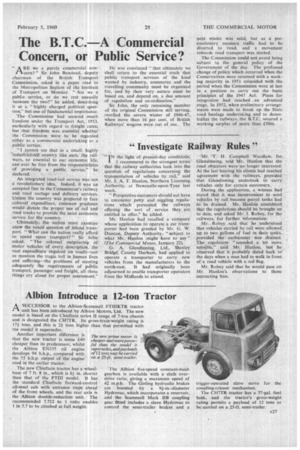The B.T.C. A Commercial Concern, or Public Service?
Page 73

If you've noticed an error in this article please click here to report it so we can fix it.
" ARE we a purely commercial con•
cern? " Sir John Benstead, deputy chairman of the British Transport Commission, asked in a paper read to the Metropolitan Section of the Institute of Transport on Monday. "Are we a public service, or do we rest uneasily between' the two?" he added, describing it as a "highly charged political question," but one Of fundamental importance.
• The Commission had :secured much freedom under the Transport Act, 1953, particularly with regard to freight rates; but that -freedom was essential whether. the Commission were to be regarded either as a commercial undertaking or •a public service.
" I cannot see that in a small, highly industrialized country like ours, the railways, so essential to our economic life, can. ever be free from the responsibilities of providing a public: service," he An integrated road-rail service was not a revolutionary idea.. Indeed, it was an accepted fact in the Commission's railway and road cartage and delivery services. Unless the country was prepared to face colossal expenditure, common prudence would 'dictate the proper -use 01 rail and road tracks to provide the most economic service for the country.
. Ultimately, the nation must examine anew the vexed question of inland transport. "What can the nation really afford to spend upon' transport? " Sir John asked. " The colossal outpouring of motor vehicles of every description, the vast expenditure required on roads—not to mention the tragic toll in human lives and suffering—the problems of meeting adequately the requirements of public transport, passenger and freight, all these things cry aloud for proper assessment" He was convinced " that ultimately we shall return to the essential truth that public transport. services of the kind wanted by industry, commerce and the travelling community must be organized for, and by their very nature must be based on, and depend on, a due amount of regulation. and co-ordination."
Sir John, the only remaining member of the original Commission still serving, recalled the severe winter of I946-47,. when more than 16 per cent, of British Railways' wagons were out of use. The next winter was mild, but as a precautionary measure traffic had to be diverted to road, and a movement towards road transport was started.
The Commission could not avoid being subject to the general policy of the Government of the day. The profound change of policy which occurred when the Conservatives were returned with a working majority in 1951 coincided with the period when the Commission were at last in a position to carry out the basic principles of the 1947 Act. Plans for integration had reached -an advanced stage. In 1952, when preliminary arrangements were made to break up the State road haulage undertaking and to decentralize the railways. the B.T,C. secured a working surplus of more than £50m.




























































































































